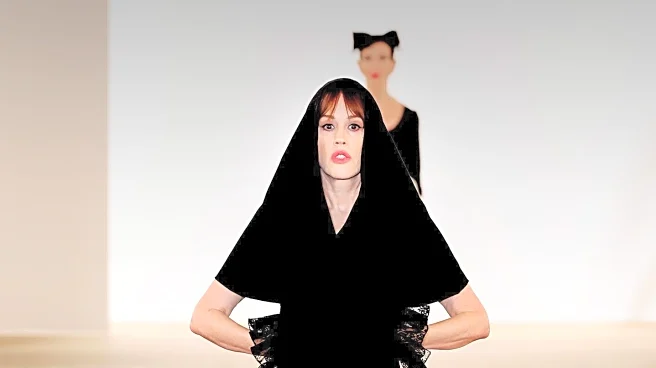What's Happening?
New York Fashion Week (NYFW) has experienced a significant decline in its traditional glamour, as unconventional sponsorships have taken center stage. The event, once a pinnacle of fashion showcasing top designers and celebrities, is now marked by bizarre brand partnerships. Recent collaborations include Melke designer Emma Gage's collection inspired by Hidden Valley Ranch, and other sponsors like Goldfish and Qdoba. This shift has led to a loss of interest among fashion insiders and attendees, with many opting out of the event. The decline began when mega-agency IMG took over from the Council of Fashion Designers of America, focusing on monetizing the event rather than maintaining its prestige.
Why It's Important?
The decline of NYFW highlights a broader trend in the fashion industry where commercial interests overshadow creative expression. This shift impacts designers, sponsors, and the city's economy, as fashion week traditionally attracted significant tourism and business. The event's loss of allure may lead to reduced investment and participation from high-profile designers and celebrities, affecting New York's status as a fashion capital. Additionally, the reliance on unconventional sponsors could dilute the event's brand, making it less appealing to traditional fashion audiences.
What's Next?
The future of NYFW may involve further shifts towards digital marketing and influencer-led campaigns, as these offer immediate visibility and lower costs compared to traditional runway shows. Designers may seek alternative platforms to showcase their work, potentially leading to a decentralization of fashion events. The city and industry stakeholders might need to reconsider their strategies to restore NYFW's former glory, possibly by re-engaging with traditional sponsors and focusing on creative collaborations.
Beyond the Headlines
The transformation of NYFW raises questions about the ethical implications of sponsorships and the commercialization of art. As fashion becomes increasingly tied to corporate interests, the industry's ability to innovate and push cultural boundaries may be compromised. This trend could lead to a homogenization of fashion, where unique voices and styles are overshadowed by market-driven decisions.










